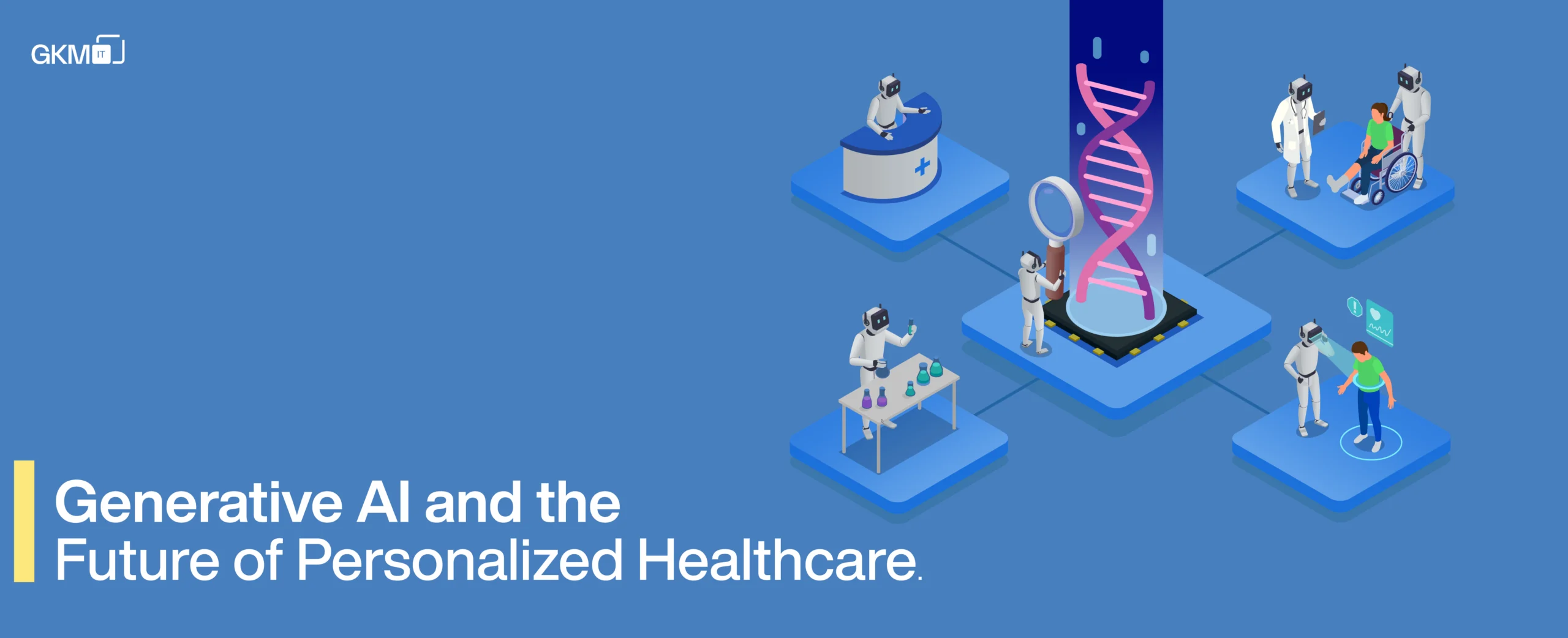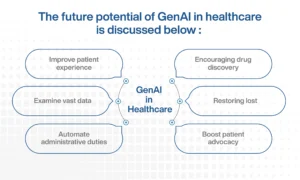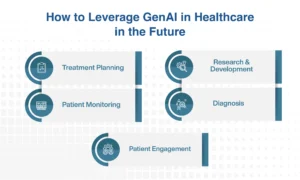
Generative AI and the Future of Personalized Healthcare
With its unparalleled potential to improve patient care, expedite processes, and stimulate creativity, GenAI is a testament to the healthcare industry’s future. Allied Market Research projects that the growing international generative AI market for healthcare will develop at a profitable rate of 34.9% between 2023 and 2032. By the end of 2032, generative AI in healthcare is predicted to reach $30.4 billion.
The promise of a better, more effective, and patient-focused future of AI in healthcare becomes a reality as the healthcare sector adopts this technology. GenAI could be very useful in fields that could speed up processes and greatly improve patient experience. More specifically, according to the research, most respondents think that GenAI could be most helpful in the field of clinical and physician productivity.
In today’s AI-driven competitive market, the healthcare industry is facing complex issues from a shortage of skilled workers and clinical burnout to decreasing profitability and negative health outcomes of patients. GenAI is playing an important role in healthcare technology by taking it to new heights.
According to Gartner, it is expected that by 2027, the adoption of GenAI models within multinational companies will grow from 1% to 50%. Thus, in the future, GenAI will be able to efficiently generate insight dynamically, creating personalized visuals for users.
The potential of GenAI in treatments helps to improve administrative productivity, and patient and representative involvement and experience, and quality of care and delivery, interest in GenAI is also expanding beyond into areas that improve total patient care interactions.
Generative AI technology has started to unleash digital waves. It is leading to a new era of healthcare transformation by improving commercial, product, and operations capabilities across industries.
Learn how this potent technology can contribute to the healthcare industry’s previously unheard-of levels of efficiency, efficacy, and innovation—and investigate a framework that can assist your company in leveraging these changes.
The future potential of GenAI in healthcare is discussed below:

- Improve patient experience
Operations may be streamlined, and patient involvement and experience may be enhanced with GenAI.
Examine vast data
GenAI can examine vast data related to medical charts, diagnostic imaging, and clinical records are examples of unstructured data that GenAI can evaluate. This can assist medical professionals in making wiser choices and creating more individualized treatment programs.
Automate administrative duties
GenAI can automate administrative chores and assist healthcare organizations with a decrease in labor shortages for informed decision-making.
Encouraging drug discovery
GenAI has the potential to revolutionize the life sciences sector, particularly in the area of drug discovery.
Restoring lost functions
By utilizing brain and nerve impulses, GenAI can assist in restoring lost functions, including voice and movement.
Boost patient advocacy
Transparency and confidence in the healthcare system can be increased by using GenAI to assist patients in understanding complicated billing records.
How to Leverage GenAI in Healthcare in the Future

Treatment Planning:
By producing treatment recommendations, GenAI can help caregivers by relieving them of repetitive duties like clinical paperwork.
Research and Development:
To find trends and produce ideas for additional study, GenAI can evaluate and summarize vast amounts of data.
Patient Monitoring:
AI-powered solutions for patient monitoring can be useful in interpreting medical records and assisting caregivers in making important choices.
Diagnosis:
GenAI has the potential to greatly improve clinical results and treatment outcomes by assisting in the much faster detection of symptoms, from upgrading medical images to screening genetic data for important insights.
Patient engagement:
Chatbots and virtual assistants driven by AI are capable of a wide range of duties, from answering questions and providing important information to teaching patients and encouraging healthy habits.
With clinical and management performance as well as patient/member engagement emerging as areas thought to benefit the most from GenAI, many CEOs polled report that their firms are first focused on deploying this technology to assist therapeutically adjacent applications. To further enhance the entire patient/member experience, you can anticipate more attention to be paid to core clinical applications as businesses strengthen their governance and risk management capabilities. Digital transformation in healthcare is directing firms towards efficiently managing their workloads and offer personalized treatment.
Irrespective of the potential of GenAI, there are obstacles in the way of its responsible application. When working with patients, risks like biases and erroneous results are especially important. AI threats appear to be the top concern for many healthcare leaders questioned as their firms integrate this new technology into processes. However, we at GKM IT assist in reducing these errors by adhering to diverse privacy rules and regulations.
It will be necessary to actively minimize risks, which begins with a deliberate effort to set up governance procedures, approaches, and safeguards to foresee, recognize, and control hazards. Healthcare companies can employ GenAI in this way to help guarantee that advantages are reached in accordance with regulatory standards without sacrificing safety or ethics. To enhance the efficiency of your healthcare company, we offer advanced healthcare solution services to assist you in attaining your long-term goal.
Related Blogs:
Smart Healthcare Through The Internet Of Things Benefits And Applications
Generative AI in Telehealth: Enhancing Telemedicine and Patient Care
Which Framework to Choose in 2025: React vs Vue?
Adoption of Generative AI in Healthcare Systems
Frequently Asked Questions
Artificial intelligence is expected to have a significant influence on healthcare in the future, with the potential to enhance patient outcomes as well as operational efficiency. The future of AI in healthcare holds an impact from simple to complex tasks – everything from answering phone calls, solving patient queries, medical record reviews, population health trending and analytics, reading radiology images, therapeutic drug and device design and making clinical plans is influenced through AI technologies in healthcare.
GenAI can assist in saving diverse healthcare costs in the future by taking over repetitive tasks, such as checking claim status and helping healthcare professionals concentrate on more complex revenue cycle management objectives. Further, AI algorithms help healthcare firms efficiently predict patients’ admission rates by reducing the manual work of healthcare professionals and enabling companies to allocate resources effectively. We at GKM IT assist in building efficient Healthcare software solutions that can help you reduce costs in the future in the Healthcare business.
There are various challenges associated with integrating AI into healthcare systems, such as lack of sufficient data, data security and privacy, interoperability issues, ethics and bias concerns, resistance to adoption and financial barriers. However, we at GKM IT work towards reducing all these challenges and helping your healthcare business attain long-term goals.
Yes, AI plays an important role in managing healthcare data effectively. By considering historical data, the current condition of patient AI in healthcare can determine patterns in patient flow, enabling hospitals to make informed decisions that improve overall patient care and operational efficiency. AI is further revolutionizing the procedure of drug discovery and development, with few AI-generated drugs already being made for clinical trials. AI helps healthcare firms in attaining their goals by making their manual work automatic.